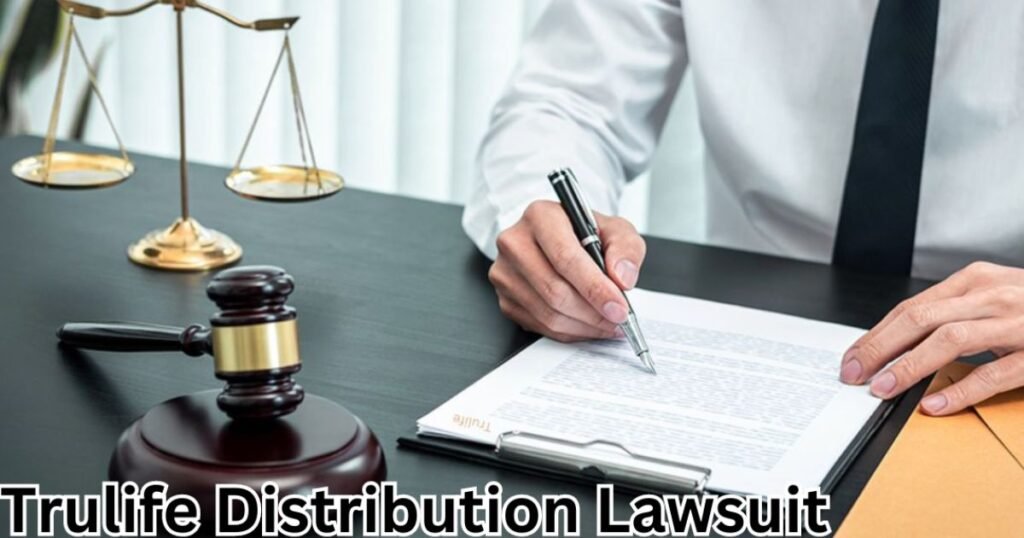Ever wondered how a family feud could shake up an entire industry? The Trulife Distribution lawsuit is doing just that, sending ripples through the supplement world. Let’s dive into this legal rollercoaster and unpack what it means for businesses like yours.
Background of the Trulife Distribution Lawsuit
Picture this: A father-son duo at odds, battling it out in court. That’s the Trulife Distribution lawsuit in a nutshell. Back in May 2022, Nutritional Products International (NPI), owned by Mitch Gould, dropped a legal bombshell on Trulife Distribution and its CEO, Brian Gould – Mitch’s son. The allegations? False advertising, deceptive trade practices, and fraud.
Talk about family drama gone corporate. NPI claims Brian Gould left the family nest only to ruffle feathers by misleading clients about Trulife’s capabilities. The result? NPI’s reputation took a hit, and business opportunities flew the coop.
Key Allegations and Legal Arguments
Misleading Advertising and Fraud
Ever felt like someone’s stretching the truth to make a sale? That’s what NPI’s accusing Trulife of doing. They claim Brian Gould painted Trulife’s expertise with a brush that was a bit too broad, leaving clients confused and NPI’s trust tank running on empty.
Unfair Trade Practices
Remember that kid in school who always bent the rules? NPI’s saying Trulife’s doing the corporate version of that. They’re alleging Trulife used some sneaky tactics to undermine NPI’s operations, like overselling their own abilities and swiping NPI’s business prospects.
Employee Poaching
Ever had a coworker leave and suddenly half the office follows? That’s the vibe here. NPI’s crying foul, saying Brian Gould didn’t just leave – he took the talent with him, weakening NPI’s team in the process.
Recent Developments
Fast forward to 2024, and things are heating up. The court’s tossed out some of Trulife’s counterclaims, narrowing the battlefield. Now, both sides are heading to mediation. Could a truce be on the horizon? Only time will tell.
Impact of Legal Proceedings on Business Practices

This lawsuit isn’t just courtroom drama – it’s shaking up how businesses operate. Trulife’s reputation is under the microscope, and the whole industry’s taking notes. It’s a wake-up call for companies to mind their Ps and Qs in marketing and operations.
Implications for the Business World
The Importance of Accurate Representation
Ever played telephone as a kid? Misrepresentation in business is like that game gone wrong. This case is screaming from the rooftops: “Say what you mean, and mean what you say in your marketing!” Fudging the facts? That’s a one-way ticket to legal trouble and customer distrust.
Ethical Hiring Practices
Poaching employees isn’t just bad form – it could land you in hot water. This lawsuit’s a reminder to play nice in the hiring sandbox. Respect those non-compete clauses and think twice before raiding a competitor’s talent pool.
Transparency and Accountability
In today’s world, secrets don’t stay secret for long. This case shows how quickly word spreads when things go south. The takeaway? Be upfront, own your actions, and keep your business practices crystal clear.
Navigating Legal Disputes in Business
Legal battles are like quicksand – the more you struggle, the deeper you sink. Trulife and NPI’s move towards mediation? That’s smart business. It’s a lesson in finding common ground without draining your resources in court.
The Ripple Effect on Consumer Trust
When lawsuits like this hit the news, consumers start asking questions. Are the supplements they’re taking really what they claim to be? It’s pushing companies to be more transparent about their products and practices.
Regulatory Scrutiny and Compliance
The FDA’s ears are perking up with cases like these. Supplement companies are facing a new reality: comply or face the consequences. It’s not just about following rules – it’s about setting a new standard for the industry.
The Role of Digital Marketing in the Supplement Industry
In a world where a tweet can tank a stock, digital marketing is a double-edged sword. This lawsuit is a stark reminder of the power – and pitfalls – of online claims. It’s pushing companies to fact-check every post and ad before hitting ‘publish’.
Building a Resilient Business Model
The Trulife case is a masterclass in why diversification matters. Relying too heavily on one strategy or client base? That’s putting all your eggs in one basket. Smart companies are now spreading their risk and building more robust operations.
The Importance of Brand Reputation Management

In the age of viral content, your brand’s rep can change overnight. This lawsuit shows how quickly negative press can spiral out of control. It’s prompting companies to invest more in proactive reputation management.
Innovation vs. Imitation: A Fine Line
The supplement industry thrives on innovation, but where’s the line between inspiration and imitation? This case is sparking conversations about intellectual property in supplement formulations. It’s challenging companies to find that sweet spot between standing out and staying legal.
The Evolution of Corporate Governance in the Supplement Industry
The Trulife case is shining a spotlight on corporate governance. It’s not just about following rules – it’s about setting a gold standard for ethical leadership. Companies are now prioritizing board diversity and implementing stricter oversight measures.
The Impact on Small vs. Large Supplement Companies
This lawsuit isn’t just a big player’s game – it’s affecting businesses of all sizes. Smaller companies are feeling the pressure to up their compliance game. Meanwhile, industry giants are realizing size doesn’t shield them from scrutiny.
Read Also: Peptiva Lawsuit: Impact on Consumers and the Supplement Industry
The Role of Industry Associations in Self-Regulation
Industry groups are stepping up to the plate in the wake of this lawsuit. They’re developing new guidelines and best practices to prevent similar situations. It’s a proactive approach to maintain industry integrity and avoid government overreach.
The Intersection of Science and Marketing in Supplements
The Trulife case highlights the tightrope walk between scientific claims and marketing hype. Companies are now more cautious about how they present product benefits. There’s a growing emphasis on backing claims with solid research and transparent studies.
The Influence on International Supplement Markets

This U.S.-based lawsuit is sending shockwaves across global supplement markets. International companies are reassessing their strategies for entering the U.S. market. It’s creating a ripple effect of increased scrutiny and compliance worldwide.
The Rise of Transparency in Ingredient Sourcing
In the aftermath of the Trulife case, ingredient sourcing is under the microscope. Companies are now more open about where they get their raw materials. This transparency is becoming a key differentiator in a crowded market.
The Impact on Supplement Industry Partnerships
The lawsuit is changing how companies approach partnerships and collaborations. There’s a new emphasis on due diligence before entering business relationships. Long-term, stable partnerships are becoming more valuable than quick deals.
The Role of Social Media in Industry Reputation
In an age where a single tweet can go viral, social media is a double-edged sword. The Trulife case shows how quickly online chatter can impact a company’s reputation. It’s prompting a more strategic, cautious approach to social media marketing in the industry.
The Shift Towards Personalized Nutrition
As trust in broad claims wavers, there’s a move towards personalized supplement regimens. Companies are investing in tech to offer tailored recommendations. This shift could reshape how supplements are marketed and sold.
The Importance of Crisis Management in the Supplement Industry
The Trulife lawsuit is a wake-up call for better crisis management. Companies are now developing robust plans to handle potential legal and PR nightmares. Quick, transparent responses are becoming the norm, not the exception.
Balancing Innovation and Regulation

The lawsuit highlights the tightrope walk between pushing boundaries and staying compliant. Companies are seeking ways to innovate within regulatory frameworks. There’s a growing dialogue between industry innovators and regulatory bodies.
The Rise of Eco-Friendly and Sustainable Practices
In the wake of increased scrutiny, sustainability is becoming a key focus. Companies are not just looking at what’s in the bottle, but how it’s made and packaged. This shift is resonating with eco-conscious consumers and regulators alike.
The Impact on Supplement Industry Investment
The Trulife case is causing investors to take a closer look at supplement companies. There’s a new emphasis on due diligence and ethical business practices. Companies with strong governance and transparency are becoming more attractive to investors.
Adapting to a New Era of Consumer Awareness
Today’s supplement consumers are more informed and skeptical than ever. Companies are responding with more educational content and transparent practices. The era of blind trust in supplement claims is over – and that might be a good thing.
Lessons for the Supplement Industry
This lawsuit is a bitter pill for the supplement industry to swallow. It’s highlighting the need for stricter self-regulation and ethical standards. Companies are realizing that cutting corners can lead to cutting losses in the long run.
The Future of Distribution in the Supplement Industry

With traditional distribution models under scrutiny, what’s next? This lawsuit is pushing companies to rethink their supply chains and partnerships. Direct-to-consumer models are gaining traction as a way to maintain control and transparency.
Read Also: White Oak Global Advisors Lawsuit Settlement: A Detailed Overview
FAQ’s
What’s the Trulife Distribution lawsuit about?
It’s about false advertising and unfair practices. NPI claims Trulife misled clients. The lawsuit involves a family dispute in business.
Who are the main parties involved?
Trulife Distribution and its CEO, Brian Gould. Nutritional Products International (NPI), owned by Mitch Gould. Mitch is Brian’s father, making it a family affair.
What are the key allegations?
Misleading advertising about Trulife’s capabilities. Unfair trade practices harming NPI’s business. Employee poaching from NPI to Trulife.
How is this affecting the supplement industry?
It’s increasing focus on ethical business practices. Companies are reviewing their marketing claims. There’s more emphasis on transparency and compliance.
What’s the current status of the lawsuit?
Some of Trulife’s counterclaims were dismissed in 2024. The court has ordered both parties to enter mediation. A settlement might be reached outside of court.
Conclusion
Imagine a family feud that’s shaking up an entire industry. That’s the Trulife Distribution lawsuit in a nutshell. It’s all about a son (Brian) leaving his dad’s (Mitch) company and allegedly playing dirty in business. False advertising, employee poaching, you name it – it’s in there.
Now, the whole supplement world is on edge. Companies are rethinking how they do business, from marketing to hiring. The big takeaway? Honesty is the best policy in business. As this legal drama unfolds, it’s clear that trust is the real MVP in the supplement game.
Everyone’s watching to see how this family feud will reshape the industry.



